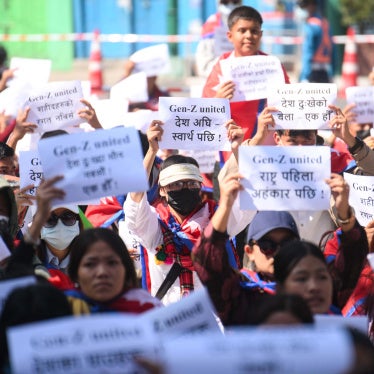Imagine you return from work one day to find the character "chai" -- demolish -- painted in red on the wall of your home. For months, a developer of high-end condominiums has been negotiating with you over compensation for the small house you scrimped and saved to buy, but now the negotiations appear to be over.
With no compensation agreement, no advance notice of your eviction, and not enough funds to rent an apartment in the same neighborhood, you might decide to see a lawyer about taking the developer to court. But before the judge has time to make a decision, you and your family are awakened in the middle of the night by shaking walls and the grinding sound of bulldozers.
Incidents like this are not uncommon -- and the lack of basic property-rights protections for homeowners and tenants is driving many in China to take to the streets. Some have taken to extreme forms of protest. In September 2003, farmer Zhu Zhengliang attempted suicide by self-immolation in Tiananmen Square to protest his family's eviction in Anhui province. Mr. Zhu's was only one of a string of suicide attempts by evicted residents.
As China modernizes and develops economically, its cities are undergoing a construction frenzy, with the sounds of hammers and drills echoing everywhere. This is especially true in Beijing, where the 2008 Olympics have inspired the construction of not only new stadiums and hotels, but also high-end residential communities and whole new satellite cities. Some individuals may own their homes, but the land beneath those homes belongs to the government. With enough yuan in hand, it is not difficult for developers to convince local officials to evict anyone who stands in the way.
In many cities, no advance notice is required for forced eviction. Those who learn about their eviction in time may try to negotiate with developers to get decent compensation -- but this is a gamble, as negotiations can end abruptly when the wrecking crew arrives. Tenants and homeowners in several cities report being hounded out of their homes in the middle of the night by hired thugs, or even by bulldozers that start knocking down the homes while residents are asleep inside.
Residents can sue developers to try to stop the destruction of their homes, and growing numbers do, but they are not likely to find satisfaction in China's weak court system. Local Communist Party officials often instruct lawyers not to try cases and judges not to hear them if the results might hurt comrades in business. Judicial corruption is also widespread.
Some lawyers face jail if they challenge the corrupt system. In
May 2003, Shanghai housing-rights advocate Zheng Enchong assisted evicted residents in preparing and filing a class-action suit charging local officials with corruption. He also shared some information about evictions with a U.S.-based human-rights group. The result was a three-year prison sentence for "circulating state secrets" in October 2003. Since Mr. Zheng's sentence, many lawyers are afraid to take on housing-rights cases.
Even in the rare cases when judges find in favor of residents, it may be too late. According to national and local laws, the developer can proceed with "forced demolition and eviction" during a pending lawsuit -- meaning that one can win a lawsuit but have already lost the home.
It is not surprising, therefore, that a significant and broad-based housing-rights movement is emerging in China, reaching from the slums of industrial Guangzhou to the villages of the central provinces, and even as far as Beijing's college campuses. Through a range of tactics -- peaceful sit-ins, petitions signed by thousands, class action lawsuits, and formal open letters to the central government -- the movement has swept into the halls of the National People's Congress, which earlier this month amended Article 13 of the constitution in order to protect "the right of citizens to own private property."
Unfortunately, the constitutional amendment will not do much for homeowners or tenants unless the government acts soon to address conflicts of interest in the local offices that manage demolition and eviction, and to overhaul the country's weak court system.
Instead of jailing people like Mr. Zheng, China should be consulting them for their expertise on the problems in the current system. By signaling government concern at the highest levels, the constitutional amendment will give hope to people evicted from their homes. But if these promises fail to bring real change, the hope will quickly turn to outrage. Beijing must free housing-rights advocates and engage in a wide-ranging overhaul of the courts to create a fairer system, or face even greater social unrest as the 2008 Olympics approach.
---
Sara Davis is Human Rights Watch's China researcher and author of a new report released today, "Demolished: Forced Evictions and the Tenants' Rights Movement in China," available online at www.hrw.org.







